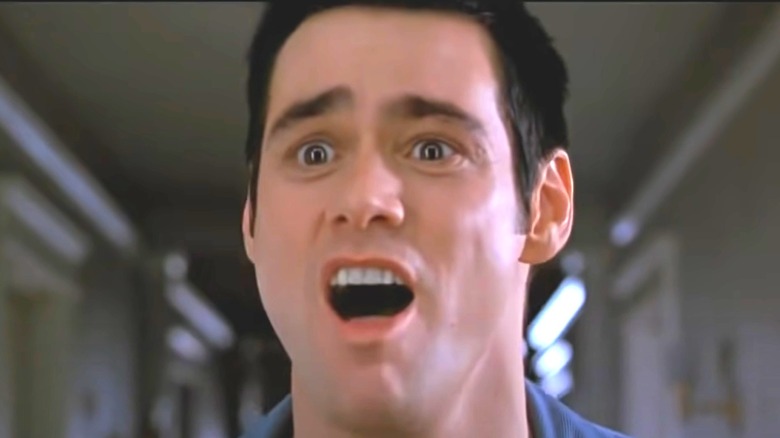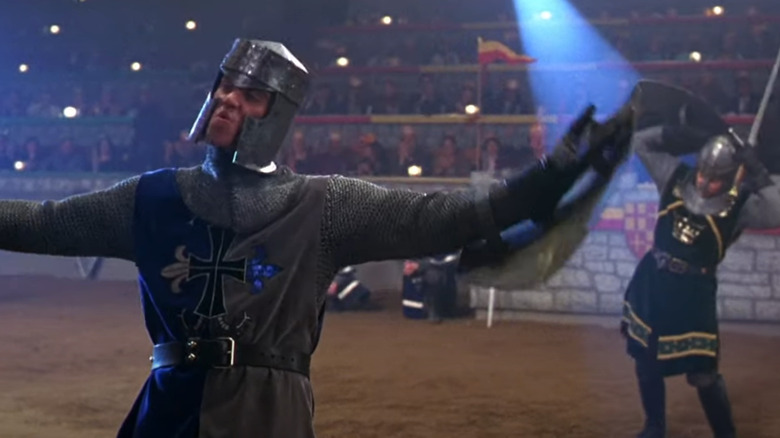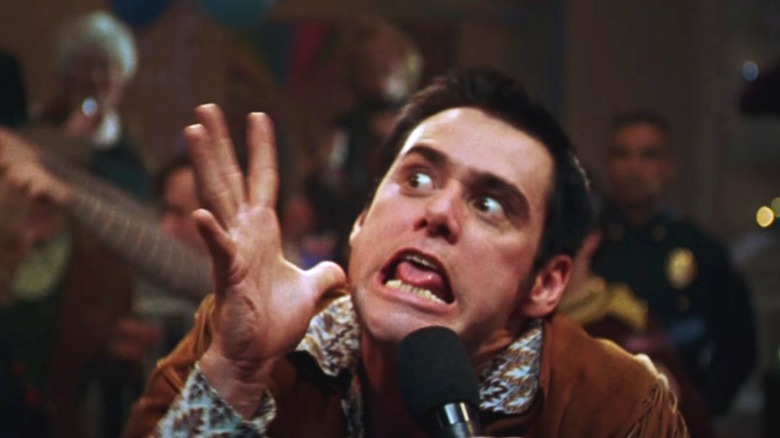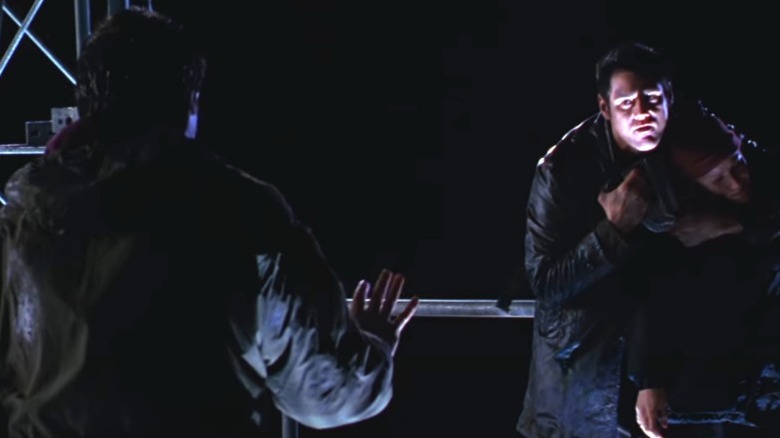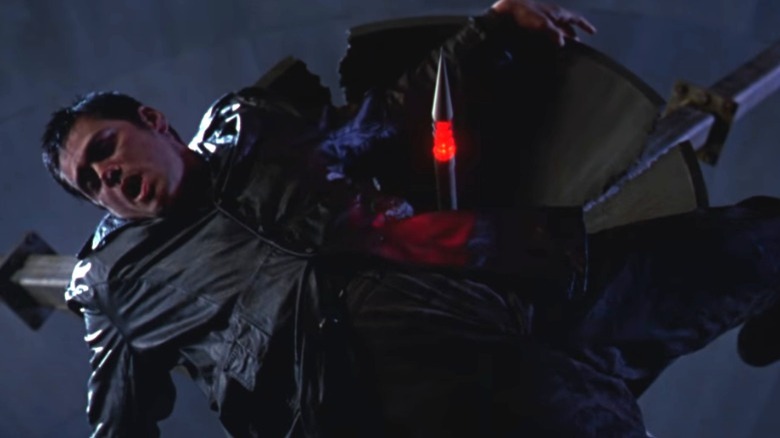The Ending Of The Cable Guy Explained
"The Cable Guy" is one of Jim Carrey's most unhinged movies. It doesn't have an ever-present "Big Brother"-like apparatus, great white bats, or god-touched masks, but it still features the manic energy the famous actor is known for. Released in 1996, "The Cable Guy" stars Carrey, Matthew Broderick, Leslie Mann, Jack Black, and George Segal, and the general plot follows Steven Kovacs (Broderick) as he goes through some relationship drama and ends up making friends with cable installer Chip Douglas (Carrey) after bribing him for illegal cable access.
However, Chip's idea of friendship is highly toxic and possessive, and his obsession with Steven grows to a fever pitch. Culminating in a standoff on a massive satellite dish on the outskirts of town, "The Cable Guy" let Carrey really get into the antagonist role, which earned him both best comedic performance and best villain at the 1997 MTV Movie + TV Awards (via IMDb). So enjoy your "preferred customer" status and fire up that fully loaded entertainment system because here is the ending of "The Cable Guy" explained.
Pop culture has a huge impact on Chip Douglas
One of the biggest aspects of "The Cable Guy" is the influence of pop culture, which tends to permeate every facet of Chip Douglas. Even the name is a false identity, taken wholesale from the 1960 sitcom "My Three Sons." When Steven's best friend, Rick (Jack Black), is charged with investigating this new friend, he finds out that Chip was fired from the cable company for stalking and that he has several aliases, all taken from TV shows.
Chip continues to exude pop culture throughout the movie, even at one point engaging Steven in one-on-one combat at a Medieval-themed dinner restaurant. This scene sees the two "friends" fight each other with Vulcan weapons inspired by "Star Trek," which is heightened by the fact that Chip does an a cappella version of the battle theme from the same episode of "Star Trek" that the weapons hail from, all the while quoting shows and movies. This highlights how disconnected Chip really is and how he seeks comfort in the familiar by acting out his favorite scenes.
Music choice is important in The Cable Guy
Music also plays a fairly large role in "The Cable Guy." One of the most iconic scenes in the flick involves Chip installing a massive entertainment system in Steven's house, proceeding to fill the house with other "preferred customers," and then firing up the karaoke system. This leads to Chip performing a stirring rendition of Jefferson Airplane's "Somebody to Love" while simultaneously planning to ruin Steven's relationship with his girlfriend, Robin (Leslie Mann). At first viewing, one might believe that the song refers to Steven wanting a romantic connection, but another take on the scene could mean that it's really about Chip's need to be loved by Steven.
During emotional scenes of the movie, both White Zombie's "More Human Than Human" and Primitive Radio Gods' "Standing Outside a Broken Phone Booth with Money in My Hand" are played for dramatic effect, the former during a moment of psychosis and the latter during a moment of sadness. The movie's promotional and ending sequence song, "Leave Me Alone," is by Alice in Chains front man Jerry Cantrell. It captures the general vibe of Matthew Broderick's character and features scenes from the film in the music video.
Identity is one of the core issues in The Cable Guy
Identity is really one of the core drivers of "The Cable Guy," for both Chip and Steven. Chip's entire personality could be considered an amalgamation of his favorite actors and characters, and he himself probably doesn't even know who he really is or what he stands for. This is highlighted in the mercurial nature of Chip and his wildly erratic responses and interactions, which are interlaced with quotes from entertainment. Even during the tense standoff on the satellite dish, which sees Chip holding Robin hostage with a stapler gun, he comments on how "this is a pretty cool place for an ending" and references the "James Bond" film "GoldenEye," which also ends in a battle on a satellite dish.
However, one could argue that Steven is also having some issues with identity. The entire string of events in "The Cable Guy" is caused by a failed attempt at a marriage proposal, which saw Steven move into his own apartment in a heartbroken state. Steven, much like Chip, had his identity tied up in another's and desperately sought validation.
The Cable Guy is about human interaction
As "The Cable Guy" reaches its final crescendo, Chip jumps off of the top of the satellite, laments about his overwhelming despair and loneliness, and tells Steven, who is desperately hanging on to his hand, that he "has to kill the babysitter." Chip says that it is too late for him and releases his grip from Steven, falling toward the dish below, which causes everyone in the neighborhood's television screens to go black when Chip finally makes contact.
The following scenes show various groups of people reacting to their televisions shutting off and the following void. One person looks around and picks up a book, showing that TV has immense power over people's lives and free time, and in a way, Chip has provided them a chance to break away from its grip, if only temporarily. Even though pop culture and entertainment form Chip's core personality, it was also his biggest impediment to actually making a real friend. The final scene of "The Cable Guy" shows a paramedic wheeling the injured Chip away. He calls him "buddy," which causes Chip to don a twisted grin. Ultimately, "The Cable Guy" is about friendships, relationships, obsession, and the potentially hazardous grip of entertainment.
